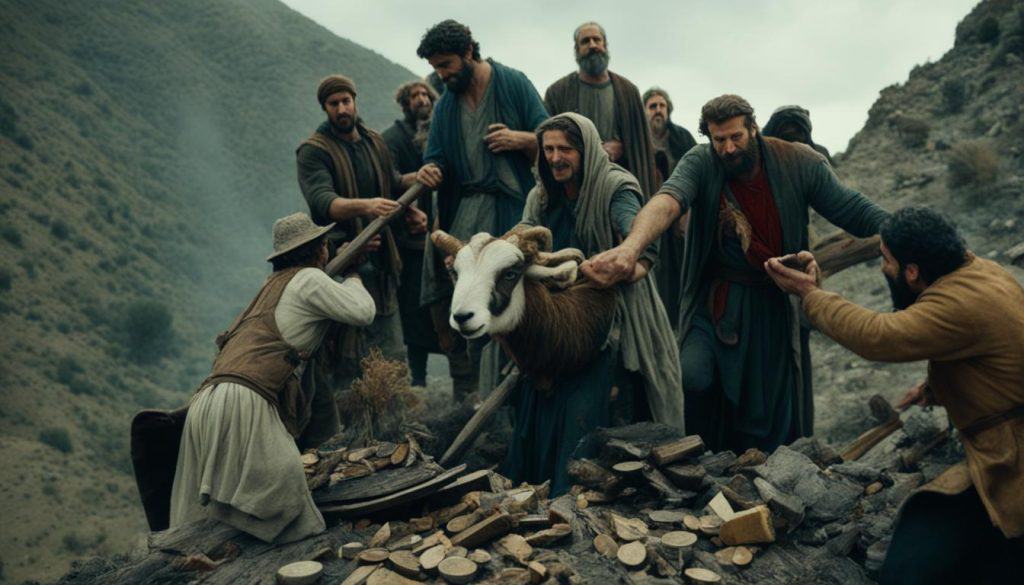You’ve probably heard of many famous stories in the Bible, but did you know that there are multiple examples of inspiring acts of sacrifice? These stories showcase unwavering faith and devotion through selfless acts that reveal the incredible power of sacrificial love.
Sacrifice in the Bible Study Generator
Use this tool to explore examples of sacrifice in the Bible, gain deeper understanding of their significance, and learn how these acts of devotion reflect God’s character. Click the buttons below to generate quotes, affirmations, and insights about biblical sacrifices. Discover what the Bible teaches about sacrifice and how these lessons can inspire your faith journey today.
In this article, we’ll explore ten powerful examples of sacrifice in the Bible that will leave you inspired and uplifted. From the widow of Zarephath to Joseph of Arimathea, these examples of sacrifice will give you a new perspective on what it means to put others before yourself.
So sit back, relax, and read on to discover some of the most powerful examples of sacrifice in the Bible.
Make Sure You Watch My Video: I would love for you to subscribe to my YouTube channel as well…
The Widow of Zarephath (1 Kings 17:7-24)
The widow of Zarephath’s story is a testament to the power of sacrificial love and faith in God’s promise.
Despite facing her own poverty and limited resources, she welcomed the prophet Elijah and sacrificed her last meal to feed him. (widow of zarephath, last meal, feed Elijah, God’s promise)
This act of incredible selflessness was rewarded by God’s grace, as the widow and her household never ran out of food.
Her dead son was also miraculously revived by Elijah, bringing joy and hope back into their lives. This story highlights the power of sacrificial giving and faith, even in the most challenging of circumstances.

“The jar of flour was not used up and the jug of oil did not run dry, in keeping with the word of the Lord spoken by Elijah.” – 1 Kings 17:16
Jephthah’s Daughter: A Tragic Tale of Devotion and Sacrifice
The story of Jephthah’s daughter is a heartbreaking account of a young woman’s unwavering devotion to her family and God.
According to Judges 11:29-40, Jephthah, a judge of Israel, had vowed to sacrifice the first thing that came out of his house if God gave him victory over the Ammonites.
Unfortunately, his only child, his daughter, was the first to come out of his house upon his return. Despite her father’s deep despair, his daughter remained strong in her faith and sense of duty.
“My father, if you have given your word to the Lord, do to me according to what has come out of your mouth, now that the Lord has avenged you of your enemies, the Ammonites. But grant me this one request,” she implored. “Give me two months to roam the hills and weep with my friends because I will never marry.” (Judges 11:36-37)
Her words reflect her willingness to fulfill her father’s vow and her sense of duty to God. Despite facing an imminent death, the daughter’s faith never wavered as she accepted her fate with grace and humility.
This tragic tale of sacrifice highlights the lengths to which people will go to honor their word and fulfill their obligations. Jephthah’s daughter embodies the true meaning of sacrificial devotion and serves as an inspiration for those seeking to deepen their own commitment to their faith and sense of duty.

| Description | |
|---|---|
| Jephthah’s daughter | The young woman who sacrificed her life as a fulfillment of her father’s vow to God. |
| Tragic tale | The story is a tragic account of a young woman’s unwavering devotion to her family and God, who willingly sacrificed her life. |
| Fulfill vow | The vow made by Jephthah that he would sacrifice the first thing that came out of his house if God gave him victory over the Ammonites. |
| Devotion | The daughter’s unwavering faith and sense of duty to God and her family. |
| Sense of duty | The daughter’s willingness to fulfill her father’s vow despite the personal sacrifice required and her own imminent death. |
Hannah (1 Samuel 1:11, 24-28)
In the time of the judges, Hannah was barren for many years. After years of yearning for a child, Hannah prayed to the Lord, promising to dedicate her son to God if she bore one. God’s mercy was upon her, and she gave birth to Samuel.
True to her word, Hannah fulfilled her promise and dedicated Samuel to the service of God, giving up her maternal rights to raise him herself and entrusting him to the temple to serve the Lord.
Her act of sacrificial love and devotion is a powerful example of the sacrifices a mother would make for her child and of the love and faith in God that fuels such sacrifices.

The bond between a mother and child is powerful, and Hannah’s sacrifice of dedicating her son to God speaks volumes of her faith and trust in the Lord.
Her willingness to make this sacrifice demonstrates her deep love for her child and her understanding of the importance of serving the Lord.
Through her act of devotion and sacrifice, Hannah teaches us the value of putting our faith in God and the importance of keeping our promises to Him. Her story reminds us that no sacrifice made in service to God is ever in vain.
The Levites: Living Sacrifices Dedicated to God’s Service
The Levites were a tribe chosen by God to be set apart from the rest of the Israelites. Unlike the other tribes, they were not given an allotment of land but instead were devoted to serving the Lord in the tabernacle and later in the temple.
They were consecrated as living sacrifices, dedicated to God’s service and the spiritual well-being of the people.

The Levites’ sacrificial commitment to God’s service was demonstrated in the extent of their duties, which included keeping the tabernacle and temple clean, tending to the altar, leading worship, teaching the people, and guarding the sacred space.
They had to ensure that the offerings made by the Israelites were done correctly and even intervened on their behalf in times of danger and sin. The Levites were also allowed to receive tithes and offerings from the other tribes to support their work.
The Levites’ commitment to serving God was an unrelenting task that required immense sacrifice. They had to deny themselves personal pursuits and ambitions to dedicate their whole lives to God’s service.
Their example serves as an inspiration to anyone who is willing to offer themselves as living sacrifices to God, setting themselves apart from worldly pursuits to pursue a greater purpose.
The Poor Widow’s Offering (Mark 12:41-44)
You may not have much to offer, but the story of the poor widow in Mark 12:41-44 proves that sacrificial giving is not about the amount, but about the heart.
Despite her poverty, she gave everything she had, two small copper coins, to the temple treasury. Jesus observed this act and commended her, stating that her gift was more significant than all the offerings of the wealthy donors combined.
Her selfless act serves as a reminder that even in the midst of poverty, you can still make a difference and that every little bit counts. Don’t be discouraged if you feel like you can’t give much, remember that it’s the sincerity and sacrifice behind the giving that counts.

Comparison of Sacrificial Giving
| Wealthy Donors | Poor Widow | |
|---|---|---|
| Amount Given | Larger sums of money | Two small copper coins |
| Sacrifice | Negligible | Everything she had |
| Recognition | None given by Jesus | Commended by Jesus |
This table highlights the contrasting attitudes towards giving between the wealthy donors and the poor widow. While the wealthy gave larger sums of money, they did not sacrifice much from their abundance.
In contrast, the poor widow’s gift may have been small, but it was everything she had. Her selfless act was recognized and commended by Jesus, who saw the sincerity and sacrifice behind her giving.
“Truly I tell you, this poor widow has put more into the treasury than all the others. They all gave out of their wealth; but she, out of her poverty, put in everything—all she had to live on.” – Mark 12:43-44 (NIV)
Rizpah (2 Samuel 21:1-14)
The story of Rizpah is one of sacrificial love and protection. Rizpah was a concubine of King Saul, and after his death, her two sons were executed and left unburied. In a selfless act of love and devotion, Rizpah guarded their bodies from birds and animals, camping out on the spot for months until they received a proper burial.
This act of protective love showcases the lengths a mother will go for her children and is a testament to the power of sacrificial love. Rizpah’s unwavering dedication to her sons and their proper burial is a powerful example of sacrificial love and serves as an inspiration to all those who may face challenging situations.
If you ever find yourself in a situation where you must make a difficult sacrifice, remember Rizpah’s unwavering commitment and draw strength from her example.

Rizpah’s Sacrifice Table
| Sacrifices | Details |
|---|---|
| Time | Rizpah camped out on the spot for months, guarding her sons’ bodies from birds and animals |
| Comfort | Rizpah endured harsh conditions on the spot, sacrificing her own comfort for her sons’ dignity in death |
| Emotional | Rizpah sacrificed her own emotional well-being for her sons, willfully isolating herself in mourning for months |
| Self | Rizpah subjugated her own desires and needs for her sons, exemplifying the ultimate act of sacrificial love |
Nazarites (Numbers 6:1-21)
In the Bible, Nazarites were individuals who made a vow to dedicate themselves to God. They displayed their devotion by taking personal sacrifices, such as abstaining from wine, not cutting their hair, and avoiding contact with corpses. By doing this, Nazarites demonstrated their commitment and sacrifice to God’s service.

“All the days of their vow of separation no razor shall touch their head. Until the time is completed for which they separated themselves to the Lord, they shall be holy. They shall let the locks of hair on their head grow long.” – Numbers 6:5
Through these personal sacrifices, Nazarites fulfilled their obligation to the Lord. Their commitment and devotion serve as an inspiring example of selflessness and dedication to God.
Onesiphorus (2 Timothy 1:16-18)
In his ministry in Rome, Paul found himself in a difficult situation. Yet, Onesiphorus sacrificially sought him out, refreshed him, and provided him with support in a time of need. Despite the danger and cost, Onesiphorus demonstrated sacrificial love and unwavering support for his friend and fellow believer.
This sacrificial act serves as a reminder of the importance of ministering to others, even in trying times. It also showcases the power of sacrificial love in strengthening relationships and providing comfort during challenging seasons of life.
“May the Lord show mercy to the household of Onesiphorus, because he often refreshed me and was not ashamed of my chains. On the contrary, when he was in Rome, he searched hard for me until he found me. May the Lord grant that he will find mercy from the Lord on that day! You know very well in how many ways he helped me in Ephesus.”
Joseph of Arimathea (Matthew 27:57-60; Mark 15:43-46; Luke 23:50-53; John 19:38-42)
Joseph of Arimathea, a secret disciple of Jesus, showed immense courage by risking his reputation and safety to provide a tomb for Jesus’ burial.
After Jesus’ crucifixion, Joseph boldly asked Pilate for Jesus’ body and carefully wrapped it in clean linen before laying it in his own new tomb. This act of sacrifice demonstrates Joseph’s deep devotion to Jesus, despite potential consequences.
As a wealthy member of the Sanhedrin, Joseph had much to risk by openly supporting Jesus, but his love for Jesus motivated him to take a stand. By providing a resting place for Jesus’ body, Joseph ensured that Jesus was given a proper burial, fulfilling prophecy and allowing for his resurrection.
Joseph’s bravery exemplifies the importance of following one’s beliefs no matter the cost. His devotion to Jesus serves as an inspiration to all.
The Woman with the Alabaster Jar: An Act of Lavish Devotion
The story of the Woman with the Alabaster Jar is one of the most touching illustrations of sacrificial love and devotion in the Bible. With expensive perfume in hand, she approached Jesus and poured it on his feet, wiping them with her hair.
This act of lavish devotion demonstrated her willingness to sacrifice her most prized possession in honor of Jesus. Her perfume was a valuable and luxurious item, yet she poured it out as an act of love and preparation for his burial.
Jesus praised her sacrifice, declaring that wherever the gospel was preached in the world, what she had done would be told in memory of her. Her act serves as a powerful example of sacrificial love and dedication, reminding us to put our most valuable possessions at the service of the greater good.
So the next time you are faced with an opportunity to show sacrificial love, remember the Woman with the Alabaster Jar and her willingness to pour out her costly perfume as a symbol of her love and devotion.
For more inspiring stories of sacrifice in the Bible, keep reading our article.
Call to Action: The Question That Demands an AnswerIn Acts 2:37 Peter and the Apostles were asked the question – What Shall We do? And in Acts 2:38 Peter answered, Repent, and be baptized every one of you in the name of Jesus Christ for the remission of sins, and ye shall receive the gift of the Holy Ghost. For the promise is unto you, and to your children, and to all that are afar off, even as many as the Lord our God shall call. Do you understand this? After hearing the gospel and believing, they asked what should would do. The answer hasn’t changed friend, Peter clearly gave the answer. The question for you today is, Have you receieved the Holy Spirit Since you believed? If you’re ready to take that step, or you want to learn more about what it means to be born again of water and Spirit, visit: Come, and let the Spirit make you new. |





